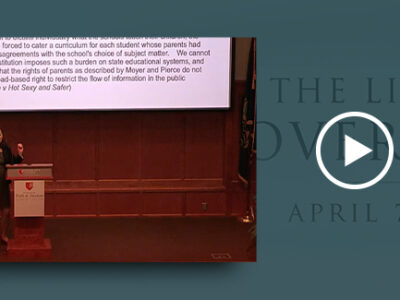Editor’s Note: The “V&V Q&A” is an e-publication from The Center for Vision & Values at Grove City College. Each issue will present an interview with an intriguing thinker or opinion-maker that we hope will prove illuminating to readers everywhere. In this latest edition, the executive director of The Center for Vision & Values, Dr. Paul Kengor, interviews author, research fellow at the Hoover Institution, and editor of the Hoover Institution’s Policy Review—Tod Lindberg.
V&V: Tod Lindberg, your new book is titled, The Political Teachings of Jesus, just released this week by HarperCollins. Most of your readers know you from your numerous columns in the Washington Times, your editorship of Policy Review, and generally through your years as an astute political observer. This book seems quite a departure for you. Why did you decide to write this book?Because Jesus has something direct and important to say about how we ought to live in this world.
V&V: What is your basic argument? What’s the main theme of the work? What you find in the political teachings of Jesus is a very carefully worked-out account of how people can build a society based on the principles of freedom and equality, one that is ever looking to extend a hand to beckon others to join. What is startling to realize is that we live in such a world—however incomplete and imperfect it may be. Its extension and improvement are our biggest political challenge.
Tod Lindberg:
Lindberg:
V&V: Literally the first words in your book are these: “The purpose of this book is to take Jesus seriously as a political thinker.” Have we not done that? If not, why not? Some have, but many have not, especially those promoting the pernicious view that Christian life is somehow a threat to freedom. That is a calumny in urgent need of correction, in my view.
V&V: You note that Jesus taught us not only about the hereafter but the here and now. Your book, it seems, is concerned with Jesus’ guidelines for the here and now, for earthly living, while acknowledging that there is, of course, an obviously strong relationship between the here and now and the hereafter. Please explain.To be blunt, Jesus didn’t want us to just sit around waiting for the hereafter; he wanted us to get busy in the here-and-now with the task of building a society organized on the principle of the Golden Rule. He saw no reason in principle why such a society could not extend “brotherly” relations to neighbors in an increasingly expanding circle of brotherhood, including to former enemies. This, too, is a part of the Great Commission.
Lindberg:
Lindberg:
V&V: If I may ask, how has this affected you in a personal-spiritual sense? That’s not an area of exploration in your book. You leave that out. I didn’t want to go there in the book because I think the political teachings of Jesus are for all people, regardless of where their spiritual journey has taken them or how far it will take them. My book is, in the same sense, for everyone.
Lindberg:
V&V: You are well-known as a political conservative, but this book doesn’t strike me as partisan either way. Will conservatives be surprised by what you have to say, and ditto for liberals? I hope so, but not because conservatives will learn Jesus was a liberal or because liberals will learn Jesus was a conservative. If you think about the world of Jesus’ time, with the Roman occupation, the court of Herod, the Temple elite, slavery, the subjection of women, the exposure of unwanted infants, the banishment of the sick, commonplace violent struggle and the routine sense in which politics was a matter of life and death, and you think about Jesus standing up to say that the meek or gentle will inherit the earth, you get an idea of how dramatically different his vision was. But at the same time, you see how careful he was in saying that he came not to abolish the law but to fulfill it: how respectful of the world of law he was. So I think there is a legitimate sense in which either a “conservative” reading of his teaching or a “liberal” reading would be a partial account of what he had to say.
Lindberg:
V&V: You say that a careful reading of Jesus’ admonition to “turn the other cheek” leads you to conclude that Jesus did not counsel passivity. Please elaborate on that.: Well, you’re going to have to read the book for the full story, but let me give you a little taste: Does your cheek turn red because of the force of the slap, or because you are embarrassed at having suffered an indignity? And if it’s because you feel you must do something in response to this indignity, is the best response to sink to the level of the person who slapped you? Or do you “turn the other cheek” in order to affirm the value of the Golden Rule-based society in which you aspire to live?
Lindberg
V&V: So, how does a president who seeks to “do what Jesus would do” know if he is doing the right thing by, say, sending troops into Iraq in 2003, or into Nazi Germany in 1945, or ever for that matter? The pacifism of Jesus is an end-state, a program for those who understand and accept the basic principles of his teaching about how to live in this world for their own societies and then start to realize that other, similarly constituted societies in other states are ones they ought to be at peace with. We are, by the way, figuring this out in real time. That’s why France and Germany won’t be going to war again, nor the United States with either France or Germany, so long as what I call the “Jesusian” teachings remain dominant in both the United States and Europe. But beware: Jesus propounds no doctrine of pacifism with regard to those seeking to overthrow societies based on his teaching of universal freedom and equality and to impose their own supremacy or ideology by force. His view of such challenges is the most difficult and complex aspect of his teaching, and one that I think readers of my book will come to appreciate a little more fully.
Lindberg:
V&V: Tod Lindberg, thanks for talking to “V&V Q&A.” Thank you.
Lindberg:



